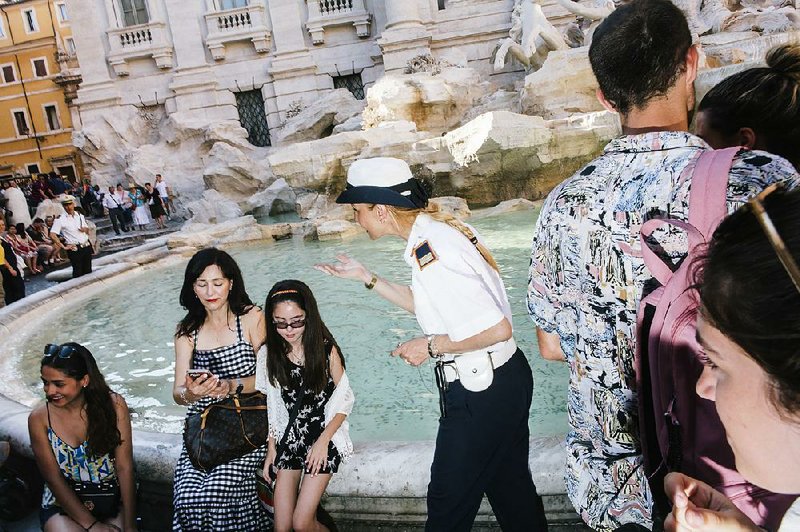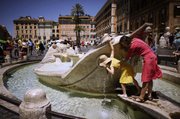ROME -- On a sweltering Monday afternoon, a beautiful day for a swim, Mario Messina noticed some holidaymakers teetering dangerously close to the turquoise waters and sounded five short blasts of his whistle.
"Come down!" Messina said, with an elegant flip of the hand to a woman leaning over the ledge to test the water temperature. "Come down!"
Despite his Ray Bans, virtuosity with a whistle and sunny Sicilian disposition, Messina is not a seaside lifeguard but a Roman police officer in a pith helmet. He is entrusted to protect the Trevi Fountain, one of the world's most cherished and visited monuments, from the scourge of parched, overheated and advancing tourist hordes. And now he has summertime reinforcements.
Already, the warm weather has led to several cases of tourists behaving badly. For months, stiff fines failed to stop a fountain-bathing fad in a city blessed with and born of flowing water.
On April 12, a man went skinny-dipping in the Trevi Fountain, resulting in a viral Web video and a fine of 500 euros ($530). "I was here for the naked guy," Messina said, adding that nudity added a criminal charge "because it was an obscene act."
That same month, a 30-year-old Spanish tourist waded into the fountain dressed in a long tunic, a German woman in her 60s took a morning dip, and two Danes received 900-euro ($1,007) fines for mistaking the Fountain of Two Seas at Rome's Piazza Venezia for a foot bath.
Then there was May. A 25-year-old Danish woman, perhaps with La Dolce Vita visions of Anita Ekberg sloshing in her head, took an evening swim in her nightgown. And two American women, according to Messina, went for a swim.
In June, a 30-year-old Malaysian man bathed nude in Gian Lorenzo Bernini's baroque Four Rivers Fountain in Piazza Navona and received a 450-euro ($503) fine. "I was hot," the man reportedly explained to police.
The police also apprehended a Czech artist washing a dirty rag in the Piazza del Popolo's Fountain of the Lions. Soon after, they fined the British and Romanian parents of two children for allowing them to climb on the lions.
The "New Barbarians," as some papers have taken to calling the tourists, are not limited to Rome. In Florence, officials have taken to hosing down the Duomo Cathedral and other sites to prevent loiterers from sitting and eating on the steps.
But it is Rome and its fountains that are in the eye of the selfie storm, prompting the city's embattled mayor, Virginia Raggi, to issue an ordinance.
Harsher fines are in place until October for eating, drinking or sitting on the fountains, for washing animals or clothes in the fountain water or for throwing anything other than coins into the water of the Trevi Fountain and 36 other fountains of artistic or historic significance around the city.
"It is unacceptable that someone uses them to go swimming or clean themselves. It's a historic patrimony that we must safeguard," Raggi said during what she called a surprise "inspection" of the situation at the Trevi Fountain.
Raggi, accompanied by two aides, went unnoticed by the tourists in beachwear and at times had trouble squeezing through the crowd. She said that to a certain degree, the bathing phenomenon has always existed, but with videos of nude fountain bathing spreading on social media, she felt "we simply must do something more. And that's what we have done."
Enemies of the mayor, a national figurehead of the anti-establishment Five Star Movement, have added the assault on monuments to the list of Roman woes under her administration, including festering trash on the city sidewalks, unkempt parks that resemble wheat fields and traffic-clogged streets transformed into idling parking lots. When in degraded Rome, they argue, tourists will do as the degraded Romans.
But it is hard to pin the tourist nuisance on her. In 1999, Italy felt the need to pass a law to protect city monuments and banned wading in the fountains. In 2012, a previous mayor drafted an ordinance fining tourists as much as $650 for dripping ice cream, dropping crumbs and eating lunch on the monuments.
Many Romans remember the local folk hero known as D'Artagnan, who for decades waded into the fountain before dawn to fish for the coins that wishful tourists had tossed in.
Still, Vittorio Avanzini, the publisher of Roman historical guides including "The Fountains of Rome," insisted that throughout the city's long history, "it's never been like this."
To combat the hordes, Dario Franceschini, the Italian culture minister, has floated the idea of limiting the number of tourists permitted to view blockbuster monuments at any one time.
"You can't have 50,000 people at the Trevi Fountain -- there's a maximum capacity. These are places to safeguard, fragile places," Franceschini said.
He welcomed the explosion of tourists from China and other countries eager to visit Italy, but said the huge numbers create new challenges and argued that new technology allowed for the automatic counting and regulation of the masses. "It's absolutely necessary."
As Raggi left the Trevi Fountain to check out the situation at a renaissance fountain in Piazza d'Aracoeli at the foot of the Capitoline Hill, she refused to entertain the limited-numbers idea.
"The monuments are for everyone," she said. "And it's fair that everyone who respects the rules can visit them, enjoy their beauty."
What Raggi and Franceschini agree on, in the spirit of politicians everywhere, is that their police -- including an undercover fountain squad -- are doing a good job of protecting the watery monuments.
On a recent afternoon, tourists' arms flew in the air like slot machine levers to toss some of the more than 1 million euros ($1.1 million) worth of coins that sink into the Trevi Fountain every year.
Messina kept a watchful eye and blew his whistle at tourists climbing up the fountain's edges. "They think it is a playground," he said, attributing the rash of fountain abuse to social media, or "advertising for bad behavior."
He recalled a Turkish tourist about six months ago who climbed all the way up the sculpture of Neptune, who lords over the fountain.
But he confided that the worst offenders were three elderly local men who came every morning to sit for hours on a bench beside the fountain, their eyes trained up at the women walking above them in short skirts.
"Obsessives," Messina said, shaking his head.
Even as Messina deftly enforced the law, he made sure not to detract from people reveling in their Roman holiday. He posed for pictures and instructed grateful tourists over which shoulder to properly toss their coin. "Right hand over left shoulder, across you heart."
He said he appreciated the ordinance and its increased manpower, from two to now six officers on duty 24 hours a day, because "thousands of tourists are not easily controlled."
He again whistled for some stragglers to get off the fountain walls as one of his reinforcements, an eighth officer in a neon mesh vest, arrived to relieve him.
"I'm here for the 5 o'clock shift," she said. "Take a break."
SundayMonday on 06/25/2017



